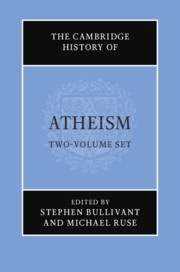Book contents
- The Cambridge History of Atheism
- The Cambridge History of Atheism
- Copyright page
- Dedication
- Contents
- Acknowledgments
- Contributors
- Introduction
- Part I Preliminaries
- Part II Atheisms in History
- Part III Reformation, Renaissance, Enlightenment
- 10 Reformation
- 11 Early Modern England
- 12 Spinoza and the Low Countries
- 13 Seventeenth- and Eighteenth-Century France
- 14 The Scientific Revolution
- 15 The Scottish Enlightenment
- 16 Al-Ghazālī
- 17 Lives of Jesus and Historico-critical Skepticism
- Part IV Classical Modernity: Philosophical and Scientific Currents
- Part V Classical Modernity: Social and Political Currents
- Part VI Twentieth and Twenty-First Centuries: Intellectual and Artistic Currents
- Part VII Lived Atheism in the Twentieth- and Twenty-First Centuries: Case-Studies
- Part VIII Emerging Atheisms in the Twenty-First Century
- Part IX Conclusion
- Index
- References
14 - The Scientific Revolution
from Part III - Reformation, Renaissance, Enlightenment
Published online by Cambridge University Press: 25 September 2021
- The Cambridge History of Atheism
- The Cambridge History of Atheism
- Copyright page
- Dedication
- Contents
- Acknowledgments
- Contributors
- Introduction
- Part I Preliminaries
- Part II Atheisms in History
- Part III Reformation, Renaissance, Enlightenment
- 10 Reformation
- 11 Early Modern England
- 12 Spinoza and the Low Countries
- 13 Seventeenth- and Eighteenth-Century France
- 14 The Scientific Revolution
- 15 The Scottish Enlightenment
- 16 Al-Ghazālī
- 17 Lives of Jesus and Historico-critical Skepticism
- Part IV Classical Modernity: Philosophical and Scientific Currents
- Part V Classical Modernity: Social and Political Currents
- Part VI Twentieth and Twenty-First Centuries: Intellectual and Artistic Currents
- Part VII Lived Atheism in the Twentieth- and Twenty-First Centuries: Case-Studies
- Part VIII Emerging Atheisms in the Twenty-First Century
- Part IX Conclusion
- Index
- References
Summary
The Scientific Revolution is conveniently dated from 1543, when the Polish astronomer Nicolas Copernicus published his De Revolutionibus Orbium Coelestium (On the Revolutions of the Celestial Spheres), in which he argued that the Earth goes around the Sun rather than the Sun around the Earth – the “heliocentric” picture of the universe from the “geocentric” picture of the universe (Kuhn 1957). It is as conveniently dated to 1687, when the English mathematician and physicist Isaac Newton published Philosophiae Naturalis Principia Mathematica (Mathematical Principles of Natural Philosophy) which, thanks to his three laws of motion and his law of gravitational attraction, gave the all-important causal explanation to what the Revolution had wrought (Westfall 1971, 1980)
- Type
- Chapter
- Information
- The Cambridge History of Atheism , pp. 258 - 277Publisher: Cambridge University PressPrint publication year: 2021
References
- 2
- Cited by



